
CHART
BOX
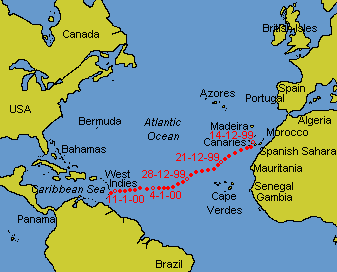
© Copyright 1999-2000 Nigel Jones/MistWeb Software

In the mid 1990s when I had first bought Rusalka Mist I keenly attended several of the newly instigated Northshore Rendezvous for owners of these and other Northshore produced boats. I met and got on very well with Kevin Seymour, the designer of the Vancouver 28 out of the original Robert Harris-designed Vancouver 27 (Click here for more on that story). I told him of my plans for long-distance travel in her and he gave me two pieces of advice: "Get yourself an RYA Yachtmaster certificate and an Amateur Radio Licence before you go."
I did both of these things and it is hard to say which was the better advice of the two. The Yachtmaster course has probably kept me safer and without it I may not be here to type this now, but the radio licence has given more pleasure and helped me while away more happy hours, winter and summer, at home and afloat.
 | CHART |
 | |
| Sketch Maps and Chartlets (not to be used for navigation!) © Copyright 1999-2000 Nigel Jones/MistWeb Software | |
Good morning, good afternoon to all on frequency. This is eight-papa-six quebec-mike, Trudi in Barbados, and this is the Transatlantic Maritime Mobile Net. So began our regular daily check-in net throughout our crossing at 1300 UTC on the amateur-allocated short-wave frequency of 21.400 MHz, USB. This time slowly slipped earlier in the day as we crossed the Atlantic, until the net was starting at 0900 local time in the last few days for us, as it always has for Trudi, and for her husband Ian in the years gone by when he used to run it.
The Net meets daily on this frequency and the purpose of the net is to keep in contact with Maritime Mobiles, especially Maritime Mobiles at sea. A radio amateur who operates his station away from his 'registered station address' may be either /P - portable, or /M - mobile, or /MM - maritime mobile. Aeronautical mobile operation is not allowed under a UK amateur licence.
Trudi and her small but dedicated band of relay stations were true to her word and the net really did meet daily, including Christmas day and New Year's Day, throughout our crossing. Daily we checked in, gave our position and a report of the weather and how rough it still was in our part of the pond. Daily we gratefully received her sympathy for our plight and her good wishes. Happily we were able to tell her every day that all was well on board. Each day she reminded us, sternly, that we were to, "Hold on tight!" We renewed our vows to do just so.
The net has moved with the times and she was insistent that we should make the effort to get our own computer plugged in and find out the e-mail addresses of our closest relatives so that she could send them electronic confirmation of our position and safety daily straight after each contact. She had about a half-dozen boats in her flock for most of the time we were in contact and the two-way e-mail service was hugely appreciated by all of us and, I am sure, by each family back home wherever that may be.
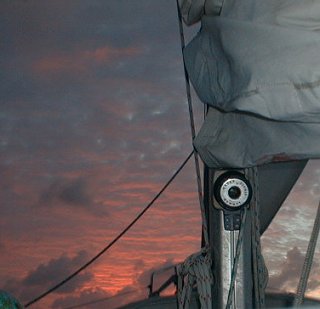 |
| If I knew more about tropical and trade-wind weather patterns, I could tell you just what these clouds herald for tomorrow's weather. Strong ENE winds again, I guess. |
At or soon after 1330 UTC she gives a daily weather forecast for the sea areas of interest to those checking in, and to those who may be listening without the capability to transmit. For our first week out one of the boats well ahead of us was relaying a translation of the Radio France International Atlantic Forecasts to Trudi for repetition to the rest of us. Trudi asked me if my French was fluent early on and I joked that really it was not. The importance of the question became clearer later when the other boat made its landfall in the Caribbean and the daily forecasts dried up. I began listening to the RFI broadcasts on 15.300 MHz AM at 11:30 UTC, and recording them on the cassette recorder built into our Roberts portable radio. I found that by re-winding the tape and using all the help I could get from a French-English dictionary and a five-language glossary in the Macmillan/Silk Cut Yachtsman's Handbook, I could indeed come up with a professional sounding and accurate translation of the forecast for the areas of interest. I could not help feeling a little pride as Trudi read out the weather forecast, "Kindly translated from the French by Nigel, M0AQJ."
Pride comes before the fall, and on New Year's Eve one of the many waves to splash through our main hatch made a direct hit onto the Roberts radio-cassette. It did not work again until I took it all to bits here in Barbados and washed each circuit board and all the wiring in clean, fresh water before drying it all carefully with kitchen paper in the sun. Without it my French was nowhere near good enough to take down the full-speed dictation in either language. Trudi saved the day again, as she had found a local Caribbean weather net run by George, KP2G, an American radio amateur, daily at 11:20 UTC on 7.086 MHz. Here he gave a weather forecast for the rhumb-line between the Canaries and the Caribbean, which was all any of us actually wanted anyway.
Apart from these nets, the short-wave receiver was very useful to both of us during the crossing for listening to the BBC World Service during the day and especially at night. To pass the time you could not beat a pair of headphones and a fascinating story about the latest research on whales and their sonic navigation and communication or the latest episode of Westway, the World Service's very own dreadful soap. The only problem was the repetition. Every program was repeated not just twice but perhaps three or four times before it disappeared off each week's play-list. This did help to add to the tedium of those long, night watches.
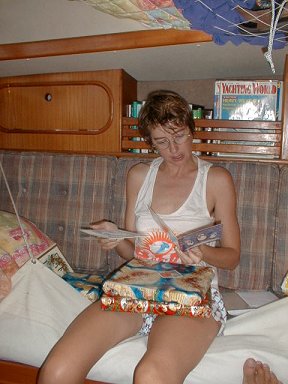 |
| Nicky's parents had left us with a locker-full of Christmas presents which we opened on Christmas morning, in mid-ocean. |
Throughout this odyssey so far, the sun has been escaping to the south daily as we have lingered to explore and relax. Regularly we have had to chase after it to regain pleasant weather.
This is about to change. At 0800 UTC on the 22nd it reaches its most southerly declination of the year - 23° 26'.3 S - we get the longest night of the year and then it starts its trek back towards us.
We are presently at 23° 26'.8 N and just about to enter its realm: the tropics.
Since Ancient times mankind has waited and prayed for this annual turnaround in the Northern Hemisphere. It means a lot as not only do the days get warmer and more pleasant again but food supplies replenish and fears of storms and frosts diminish.
In ancient times it was very difficult to discern this exact moment of turnaround. New Year's Day and Christmas Day are probably based on two examples of early attempts to identify this moment and to celebrate it. By turning the pages of the Nautical Almanac I can pin-point the moment, in advance, with a precision that would have staggered a Druid priest.
But that doesn't mean that it means any less to me out here at the mercy of the Ocean than it would have done to him in his time. Out here you feel the rhythms of nature's power pretty keenly.
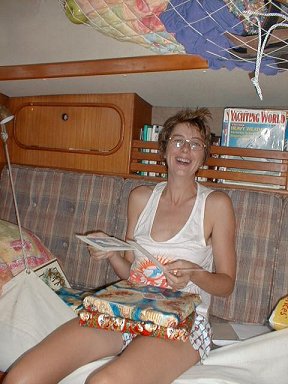 |
| We had stashed away two half-bottles of very pleasant Spanish champagne from Tenerife - one for Christmas and one for New Year. It was a very sparkling breakfast to help make this a special day at sea. |
'High Tide and Green Grass' the Rolling Stones named one of their early albums, signifying good times. We all like our mornings sunny, our evenings long and warm, our grass green and our tides high. Winter is the antithesis of this feeling - everything is at full wane. Those last days before mid-winter are the worst of all - everything is about as bad as it can get and you know it is still getting worse.
Knowing that, by some precise scientific measurement, the moment of fullest retreat has been identified and has passed lightens the feeling. I know that tomorrow's daylight will be less than a minute longer than today's was but the movement is now there in my mind as a fact and I can feel into it and draw strength from it whenever I want.
Is this a yin and yang thing? Certainly it is. Yang energy is the growing, expanding, creative, life-giving side and represents this perfectly. Chinese culture is so keen on this idea of the exact middle that ![]() , their most perfect ideogram for centre or middle is part of the name of their land - chung-gua. The energy-source centre of the human form is fundamental to Taoist and also to Buddhist meditation. Once you have found the very centre, the very middle, of something you have a handle on its absolute essence.
, their most perfect ideogram for centre or middle is part of the name of their land - chung-gua. The energy-source centre of the human form is fundamental to Taoist and also to Buddhist meditation. Once you have found the very centre, the very middle, of something you have a handle on its absolute essence.
Out here in the ocean, we have no concept of tides or of green grass, but we are very aware of nature's power and capricious moods. One swipe of the tail of this ocean's winter energy would be more than enough to swat us to kingdom come. We have carefully planned to be in the tropical seas at midwinter and to be here outside of any hurricane season, but there is a lightness in the knowledge that we have put a finger to the very darkest of this winter's days - and it is past. As the days begin to lengthen, surely will come spring and eventually our return to northern waters and our homecoming.
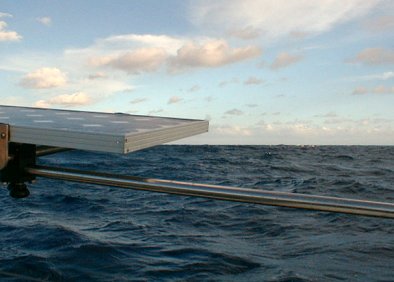 |
| Outside, the Atlantic shows us a calmer face, for a change |
Later tonight we shall pass the mid-point of this, our first Atlantic crossing. We shall be 1358 miles into the 2716-mile journey. Like all mid-points in position and in time this can take on a great deal of significance in our minds if we want it to. I have seen several photographs, published in the yachting press of crews dressed up and/or raising beer cans to the camera as this milestone is passed on similar trips.
As a school teacher, when I thought of it with a Year 9 group just before the February mid-term break I would try to focus their minds on the fact that at, say, midnight on the Friday of a four-day break they would be exactly half way through their secondary education (from Year 7 to Year 11). This spell-bound a few of them for a few seconds, lead to a loud and hearty cheer from many others, and maybe caused one or two of them to take stock under the realisation that even at their young age (13 - 14 years) they were beginning to feel the rhythm of their whole lives with is phases which come and then pass forever, like it or not.
"And so this is Christmas, And what have you done? Another year over, Another year just begun."
John Lennon, as he often had before, captured in these simple words an important part of the profound helplessness in the modern, suburban life. If we were hoping for more, or less, or better, these milestones which mark the mid-points are good times to take stock and to focus our minds for the next half.
The days are already lengthening imperceptibly again, Christians worldwide have celebrated again the re-birth of the child who will save us all and our journey enters its second half. There's light at the end of every tunnel. Now with satisfaction toward what's past and hope for what is to be, we put our minds back into the work in hand and set off into the next single step.